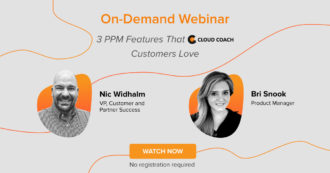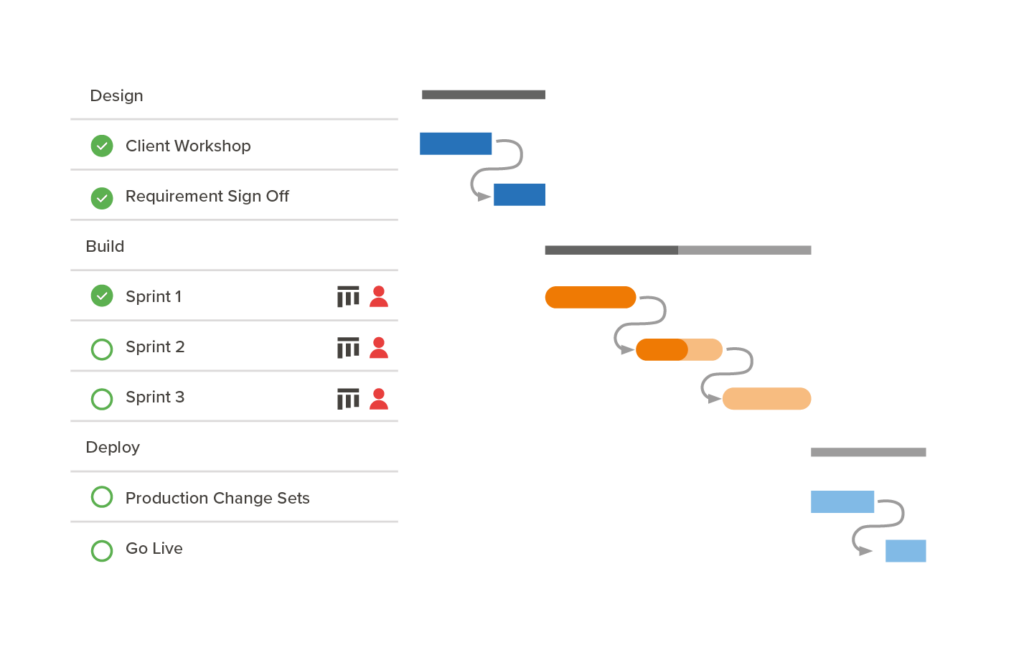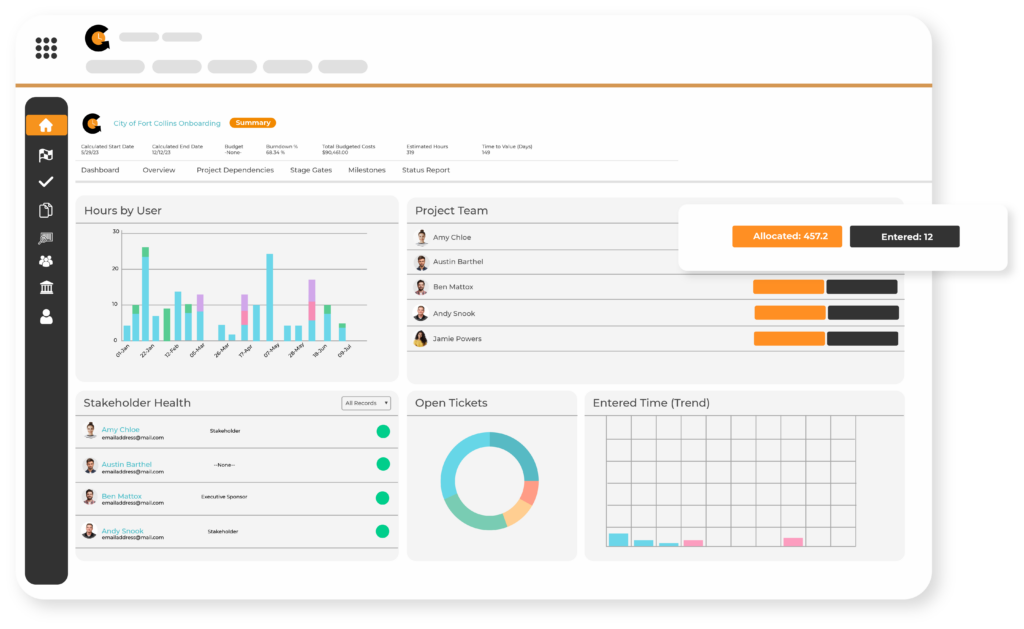 Webinar
Webinar

Project Management Offices (PMOs) are responsible for managing and overseeing the portfolio of projects. PMOs help ensure that these projects are aligned with organizational goals and are delivered on time. They also ensure the projects are within budget and completed to the desired quality. To achieve these goals, PMOs need access to the right project management tools, and PMO software is an essential tool that can help.
PMO software is a solution that is specifically designed to help PMOs streamline project management processes, improve project visibility, and enhance collaboration among team members. It offers a range of features that enable PMOs to plan, monitor, and control project performance effectively.
In addition to the benefits mentioned above, PMO software can help PMOs in various ways. It can help PMOs manage project resources effectively, enabling them to allocate resources based on project priority and demand. PMO software can also help PMOs ensure compliance with regulatory requirements and standards. It provides PMOs with project templates, dashboards, and reports that help them monitor project performance and identify areas for improvement.
When selecting PMO software, it is crucial to consider the organization’s specific needs. Some PMO software options, such as Cloud Coach, are built on Salesforce, providing a scalable and customizable solution for PMOs. Other PMO software options, such as Microsoft Project Online and Wrike, offer advanced features such as resource management, Gantt charts, and project reporting.
PMO software is essential for PMOs to manage and oversee projects effectively. It helps PMOs streamline project management processes, improve project visibility, and enhance collaboration among team members. When selecting PMO software, it is important to consider the organization’s specific needs and choose a solution that aligns with the organization’s goals and supports its project management processes. With the right PMO software in place, PMOs can ensure successful project outcomes and achieve organizational goals.

A Project Management Office (PMO) is a central function within an organization that is responsible for managing projects and project portfolios. PMOs ensure that projects are delivered on time, within budget, and to the desired quality standards. They provide various services and support to project teams, including project planning, scheduling, monitoring, and reporting.
PMOs are typically established in organizations that manage multiple projects simultaneously or have a significant investment in project-based work. They help ensure consistency in project management processes across the organization, providing guidance, training, and support to project teams. The specific role and responsibilities of a PMO may vary depending on the size and structure of the organization and project management maturity.
There are different types of PMOs, ranging from supportive to controlling. Supportive PMOs provide guidance and structure to project teams and help with project management tools and methodologies. They also provide support for project managers. These PMOs can help with things like training and mentoring. On the other hand, controlling PMOs provide oversight and governance to project teams. This makes sure that projects are aligned with the organization’s strategic objectives.
The benefits of having a PMO in an organization include improved project visibility, better resource allocation, enhanced collaboration among team members, and more efficient project management processes. PMOs can help organizations deliver projects successfully by providing standardized project management processes, improving project performance, and reducing project risk.
ADDITIONAL LINKS
A PMO structure is a group or department within an organization that defines and maintains project management standards. PMO, which stands for program or portfolio management office, oversees the metrics, benchmarks, quality, and documentation that are needed when maintaining consistency in a project or program. This is also extremely useful for those maintaining consistency in portfolio management and execution. The PMO structure may be internal or external and provides the framework and organizational standards for managing and executing projects.
There are several types of PMO organizational structures, with each company’s culture influencing its evolution. Here are the most common PMO roles:
The directive PMO exercises significant control by providing project management expertise, setting project management standards, and managing projects within the organization. Project managers report to the directive PMO for guidance and oversight.
The controlling PMO creates documentation, methodologies, templates, and frameworks for project managers to follow, ensuring organizational standards for successful project management and execution.
The supportive PMO acts as an organization’s project repository and provides consultative support. The supportive PMO’s role is mainly to consult the MPO. They don’t have a lot of control over the project management but rather provide the project manager with crucial help and insight. They often help with templates, training, and overall sharing of their expertise.
Other PMO structures based on organizational hierarchy include:
The individual PMO provides support for managing projects and programs. They set the standards for these projects and programs to follow and supervise to ensure these standards are met.
The business unit PMO is also called a departmental PMO. This person oversees multiple projects across varying departments. They directly handle project management and report to the division manager.
The enterprise PMO exists in large enterprises. They make sure that resources are allocated correctly, the correct projects are in progress, and the correct tasks are prioritized. They continuously find ways to improve their method of project management, create standards for the project to meet, and procedures to follow in order to meet these standards.
The decentralized PMO acts more as an adviser to the project manager, putting project managers and the team in control of their tasks.
The centralized PMO works in a more controlled manner, deciding on project standards and processes and having a lot of authority around decision-making and problem-solving.
Overall, the PMO structure provides a standardized approach to project management using PMO structure best practices, enabling organizations to execute projects more efficiently.
When it comes to managing projects, having the right tools can make a significant difference in ensuring success. The best project management software for small teams can provide a range of benefits, such as increased collaboration, streamlined communication, and better project visibility.
Top project management tools, such as Cloud Coach Asana, Trello, and Wrike, are among the most popular software options. These tools offer features that effectively help teams manage tasks, timelines, resources, and budgets. They also provide reporting capabilities that allow teams to track project progress and identify areas for improvement.
In addition to the popular project management software options, other tools are worth considering, such as Monday and Basecamp. These tools offer unique features that can be tailored to meet specific project management needs, making them great options for small teams.
The most popular project management software tools provide small teams with a comprehensive platform to manage all aspects of their projects. These tools offer advanced features that help teams stay on track, communicate effectively, and collaborate efficiently. Small teams can improve project management processes, boost productivity, and achieve successful project outcomes by using the best project management tools.

When selecting the best project management software or the best project management app, PMOs must consider several factors, such as the product’s features, scalability, cost, and ease of use.
Cloud Coach is our project management solution built on Salesforce. Our project management solution is a robust and scalable toolset that provides project visibility, resource management, collaboration, and customization.
Here are the top ten project management tools that PMOs can use to manage their projects successfully:
Cloud Coach:
A project management software built on Salesforce, providing a robust and scalable solution for PMOs.
Asana:
A project management tool that allows teams to collaborate on projects and track progress in real-time.
Trello:
A visual project management tool that uses boards, lists, and cards to help teams collaborate on projects.
Wrike: A project management tool that provides a range of features, including task management, team collaboration, and project reporting.
Smartsheet:
A project management tool that enables teams to collaborate on projects and track progress in real-time.
Microsoft Project Professional:
A project management tool that provides a range of features, including task management, team collaboration, and project reporting.
Monday:
A project management tool that allows teams to collaborate on projects and track progress in real-time.
Basecamp:
A project management tool that provides a range of features, including task management, team collaboration, and project reporting.
Jira:
A project management tool designed for software development teams.
Salesforce Project Management:
A native project management solution within Salesforce that offers project tracking, resource management, collaboration, and reporting features.
Choosing the right project management app from these top 10 project management tools can significantly impact your team’s productivity, collaboration, and project success. Each project management tool has its strengths, and each team has its own ways of collaboration. As a PMO, your role is to ensure your team has access to the right project management tools and practices to help them deliver successful projects. So, take the time to explore the options and find what works best for your team’s unique needs and preferences.
When the task at hand is comparing PMO (Project Management Office) software, it is imperative to delve into a meticulous analysis of the various products on offer. The research should revolve around examining the key features of these software solutions, their comparative advantages, and any inherent drawbacks they may have. This field teems with an assortment of well-engineered enterprise PMO software options, each presenting unique strengths and weaknesses based on assigned tasks and demands.
In the quest to identify the best PMO software, the scope of review must center on several vital components. These can include:
– User interface ease-of-use and adaptability across various platforms and devices
– Availability of customizable configurations to meet the enterprise-specific needs
– The efficiency and effectiveness of the project and portfolio management control tools
– Robustness of the integrated risk management and strategy alignment features
– Availability, quality, and reliability of the technical support
– Compliance with contemporary data security standards
When performing a PMO software comparison, it is crucial to maintain a keen focus on these features among others. Their individual and combined effects on operational efficiency, project outcome predictability, and overall resource management make them defining factors in the software selection process.
The most astute enterprises understand that the best PMO software is not just about rich feature sets. The chosen solution must demonstrate consistency in its performance metrics, guaranteeing reliable service delivery as per the project timelines. Furthermore, it must be scalable to fit the unique and evolving needs of your business.
In the market of PMO software, providing a qualitative comparison requires a delicate balance between factual accuracy and objective analysis. As such, every feature should be weighed not only on its individual merit but how it collaboratively contributes to the overall functionality of the software. This allows for a more realistic comparison, ultimately leading to a more informed decision-making process.
We’d be happy to provide a bespoke 1:1 demo on how Cloud Coach can benefit for your business.